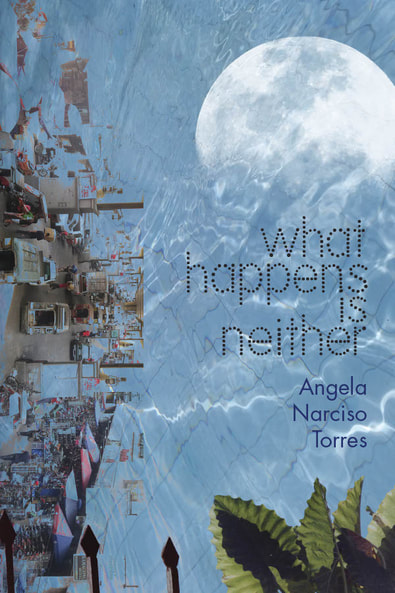- Home
- About
- Submit
- Features
- Interviews
- Book Reviews
- Previous Issues
- Blog
- Contact
-
Issue #25 Spring 2023
- Issue #25 Art Spring 2023 >
-
Issue #25 Poetry Spring 2023
>
- Emma Bolden Spring 2023
- Ronda Piszk Broatch Spring 2023
- M. Cynthia Cheung Spring 2023
- Flower Conroy Spring 2023
- Jill Crammond Spring 2023
- Sandra Crouch Spring 2023
- Satya Dash Spring 2023
- Rita Feinstein Spring 2023
- Dan Fliegel Spring 2023
- Lisa Higgs Spring 2023
- Dennis Hinrichsen Spring 2023
- Mara Jebsen Spring 2023
- Abriana Jetté Spring 2023
- Letitia Jiju Spring 2023
- E.W.I. Johnson Spring 2023
- Ashley Kunsa Spring 2023
- Susanna Lang Spring 2023
- James Fujinami Moore Spring 2023
- Matthew Murrey Spring 2023
- Pablo Otavalo Spring 2023
- Heather Qin Spring 2023
- Wesley Sexton Spring 2023
- Ashish Singh Spring 2023
- Sara Sowers-Wills Spring 2023
- Sydney Vogl Spring 2023
- Elinor Ann Walker Spring 2023
- Andrew Wells Spring 2023
- Erin Wilson Spring 2023
- Marina Hope Wilson Spring 2023
- David Wojciechowski Spring 2023
- Jules Wood Spring 2023
- Ellen Zhang Spring 2023
- BJ Zhou Spring 2023
- Jane Zwart Spring 2023
- Issue #25 Fiction Spring 2023 >
- Issue #25 Nonfiction Spring 2023 >
-
Issue #26 Fall 2023
- Issue #26 Art Fall 2023 >
-
Issue #26 Poetry Fall 2023
>
- Fasasi Abdulrosheed Oladipupo Fall 2023
- Christopher Ankney Fall 2023
- Magdalena Arias Vásquez Fall 2023
- John Peter Beck Fall 2023
- Mihir Bellamkonda Fall 2023
- Benjamin Bellas Fall 2023
- Michael Carson Fall 2023
- Kevin Clark Fall 2023
- Aaron Coleman Fall 2023
- Mark DeCarteret Fall 2023
- Denise Duhamel Fall 2023
- Brandel France de Bravo Fall 2023
- Tina Gross Fall 2023
- Amorak Huey Fall 2023
- James Kimbrell Fall 2023
- Casey Knott Fall 2023
- Stephen Lackaye Fall 2023
- Cynthia Manick Fall 2023
- Savannah McClendon Fall 2023
- John Muellner Fall 2023
- Mollie O’Leary Fall 2023
- Joel Peckham Fall 2023
- Natalia Prusinska Fall 2023
- henry 7. reneau, jr. Fall 2023
- Esther Sadoff Fall 2023
- Hilary Sallick Fall 2023
- Kelly R. Samuels Fall 2023
- Issue #26 Fiction Fall 2023 >
-
Issue #27 Spring 2024
- Issue #27 Art Spring 2024 >
-
Issue #27 Poetry Spring 2024
>
- Terry Belew Spring 2024
- Dustin Brookshire & Diamond Forde Spring 2024 Spring 2024
- Dustin Brookshire & Caridad Moro-Gronlier Spring 2024 Spring 2024
- Charlie Coleman Spring 2024
- Isabelle Doyle Spring 2024
- Reyzl Grace Spring 2024
- Kelly Gray Spring 2024
- Meredith Herndon Spring 2024
- Mina Khan Spring 2024
- Anoushka Kumar Spring 2024
- Cate Latimer Spring 2024
- BEE LB Spring 2024
- Grace Marie Liu Spring 2024
- Sarah Mills Spring 2024
- Faisal Mohyuddin 2024
- Marcus Myers Spring 2024
- Mike Puican Spring 2024
- Sarah Sorensen Spring 2024
- Lynne Thompson Spring 2024
- Natalie Tombasco Spring 2024
- Alexandra van de Kamp Spring 2024
- Donna Vorreyer Spring 2024
- Fiction #27 Spring 2024 >
- Nonfiction #27 Spring 2024 >
What Happens Is Neither
|
Review
|
A Review of Angela Narciso Torres' What Happens is Neither
Often, our lives are defined by our memories; places we have been and people we have known; decisions and mistakes made; spoken and unspoken words; the lives of friends and loved ones long after they are gone. How we remember each of these things defines who we are in the present, and how we will be in the future, whether they are happy or sad. For her third book, Angela Narciso Torres uses these feelings to create formal and free verse poems that illustrate a beautiful tapestry of memories stitched together through family bonds, country, and mourning. Torres begins with a dedication, writing, “for Carmen Tanesco Narciso 13 September 1936 – 27 May 2019 and Francisco Villaruz Narciso 2 October 1935 – 7 June 2019” setting the tone for readers that the poems held in their hands tell the story of her own loss, the reminiscing of her mother and father, who passed away mere weeks apart from Alzheimer’s and cancer, respectively. Torres challenges readers to remember loved ones as they were in the past, rather than their deaths: to celebrate the lives they lived and to cope with the grief brought by their passing: I remember brownouts. Melted wax Above, Torres writes about her mother’s scent, the guava fruit, as she recalls a memory of younger days in “Recuerdo a Mi Madre,” giving pause to the reader as she delves into a rollercoaster of emotion, as the poem is read in vignettes that allude to the senses, filling the nose with the scent of lavender candles wafting about, before an incident involving her mother takes center stage, followed by her father’s quick action: “Called an ambulance. / Her silence an explosive / he’d learned to detonate.” Her mother’s Alzheimer’s disease is referenced throughout the book, with many poems speaking of Torres’ own pain of living through it alongside her father, who would play his violin until her mother slept. Even though she no longer recognizes him, he remains a rock beside her despite his own battle with cancer.
Part of Torres’ brilliance in these poems is in how she weaves together old mementos of her parents, recalling even the tiniest details in her stunning imagery that can send shockwaves of emotion through time such as in “Watch”: Here in these cracked One can almost hold the watch in their hand as they read the poem, and perhaps some have also held an object of similar meaning to them, relating to the time it stopped ticking, yet the symphony continues to beat against time just as the heart does. This same play with mementos is seen throughout the book, particularly her father’s violin, which appears in several other poems. This recurring theme carries with it a sense of standing at the crossroads between life and death, old belongings and lessons breathing life back into a loved one that has long passed on, so that in a way, they are never truly gone, only carried forward in spirit by those who remain.
Torres also writes about her own experiences as a mother, including the difficulty of carrying a pregnancy to term, and how swiftly tragedy can strike, the poem a whirlwind of distraught wonder and accusation: "I blamed the rain the fried eggplant / the trip to the mall blamed my past selfish ways" as described in “To the One We Lost,” a lamentation for miscarriage. The idea of breastfeeding is also touched on in “Ode to the Areola,” and “The Foul Rag and Bone Shop of the Heart,” a Golden Shovel borrowing a line from William Butler Yeats: I’m not just talking about the The poem tells readers that motherhood is both a rewarding and fierce challenge, that it is as much of a battle as it is a joyous journey, and Torres utilizes these gritty displays to eloquently create a connection between the romanticized and the natural, and the result is hauntingly beautiful.
With each new poem, the tapestry continues to knit itself together as What Happens is Neither creates a narrative of moving forward as we cope with loss, remembering who our loved ones were and how they lived, forging a glimpse into another reminiscent time seen through small but significant details. Playing upon the senses--especially employing scent and color--to urge readers to reflect, understand, and revise, Angela Narciso Torres has created a powerful collection of poetry that is seamlessly interconnected. Each piece is unique as she attests to the power of revision, memory, and change that can arrive as powerfully as a storm in the ocean. A storm that can destroy what we have so that we must learn how to build back, let go of what was lost and begin again, as Torres concludes in the book's final poem, “The wind rises, rewriting the hymnals of dunes. / I am hurricaned. Worn smooth again." |
|
Salvador Martinez is an undergraduate studying Political Science and English at Lewis University and is a poetry editor and book review editor for Jet Fuel Review. He enjoys reading poetry, fantasy fiction, science fiction, classical works, and political theory while listening to music on his phonograph, playing one of his guitars, or simply writing prose or poetry.
|
- Home
- About
- Submit
- Features
- Interviews
- Book Reviews
- Previous Issues
- Blog
- Contact
-
Issue #25 Spring 2023
- Issue #25 Art Spring 2023 >
-
Issue #25 Poetry Spring 2023
>
- Emma Bolden Spring 2023
- Ronda Piszk Broatch Spring 2023
- M. Cynthia Cheung Spring 2023
- Flower Conroy Spring 2023
- Jill Crammond Spring 2023
- Sandra Crouch Spring 2023
- Satya Dash Spring 2023
- Rita Feinstein Spring 2023
- Dan Fliegel Spring 2023
- Lisa Higgs Spring 2023
- Dennis Hinrichsen Spring 2023
- Mara Jebsen Spring 2023
- Abriana Jetté Spring 2023
- Letitia Jiju Spring 2023
- E.W.I. Johnson Spring 2023
- Ashley Kunsa Spring 2023
- Susanna Lang Spring 2023
- James Fujinami Moore Spring 2023
- Matthew Murrey Spring 2023
- Pablo Otavalo Spring 2023
- Heather Qin Spring 2023
- Wesley Sexton Spring 2023
- Ashish Singh Spring 2023
- Sara Sowers-Wills Spring 2023
- Sydney Vogl Spring 2023
- Elinor Ann Walker Spring 2023
- Andrew Wells Spring 2023
- Erin Wilson Spring 2023
- Marina Hope Wilson Spring 2023
- David Wojciechowski Spring 2023
- Jules Wood Spring 2023
- Ellen Zhang Spring 2023
- BJ Zhou Spring 2023
- Jane Zwart Spring 2023
- Issue #25 Fiction Spring 2023 >
- Issue #25 Nonfiction Spring 2023 >
-
Issue #26 Fall 2023
- Issue #26 Art Fall 2023 >
-
Issue #26 Poetry Fall 2023
>
- Fasasi Abdulrosheed Oladipupo Fall 2023
- Christopher Ankney Fall 2023
- Magdalena Arias Vásquez Fall 2023
- John Peter Beck Fall 2023
- Mihir Bellamkonda Fall 2023
- Benjamin Bellas Fall 2023
- Michael Carson Fall 2023
- Kevin Clark Fall 2023
- Aaron Coleman Fall 2023
- Mark DeCarteret Fall 2023
- Denise Duhamel Fall 2023
- Brandel France de Bravo Fall 2023
- Tina Gross Fall 2023
- Amorak Huey Fall 2023
- James Kimbrell Fall 2023
- Casey Knott Fall 2023
- Stephen Lackaye Fall 2023
- Cynthia Manick Fall 2023
- Savannah McClendon Fall 2023
- John Muellner Fall 2023
- Mollie O’Leary Fall 2023
- Joel Peckham Fall 2023
- Natalia Prusinska Fall 2023
- henry 7. reneau, jr. Fall 2023
- Esther Sadoff Fall 2023
- Hilary Sallick Fall 2023
- Kelly R. Samuels Fall 2023
- Issue #26 Fiction Fall 2023 >
-
Issue #27 Spring 2024
- Issue #27 Art Spring 2024 >
-
Issue #27 Poetry Spring 2024
>
- Terry Belew Spring 2024
- Dustin Brookshire & Diamond Forde Spring 2024 Spring 2024
- Dustin Brookshire & Caridad Moro-Gronlier Spring 2024 Spring 2024
- Charlie Coleman Spring 2024
- Isabelle Doyle Spring 2024
- Reyzl Grace Spring 2024
- Kelly Gray Spring 2024
- Meredith Herndon Spring 2024
- Mina Khan Spring 2024
- Anoushka Kumar Spring 2024
- Cate Latimer Spring 2024
- BEE LB Spring 2024
- Grace Marie Liu Spring 2024
- Sarah Mills Spring 2024
- Faisal Mohyuddin 2024
- Marcus Myers Spring 2024
- Mike Puican Spring 2024
- Sarah Sorensen Spring 2024
- Lynne Thompson Spring 2024
- Natalie Tombasco Spring 2024
- Alexandra van de Kamp Spring 2024
- Donna Vorreyer Spring 2024
- Fiction #27 Spring 2024 >
- Nonfiction #27 Spring 2024 >


